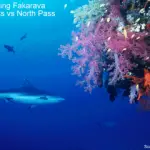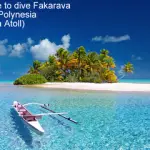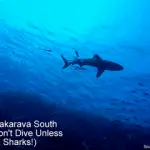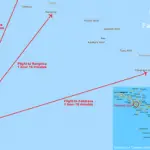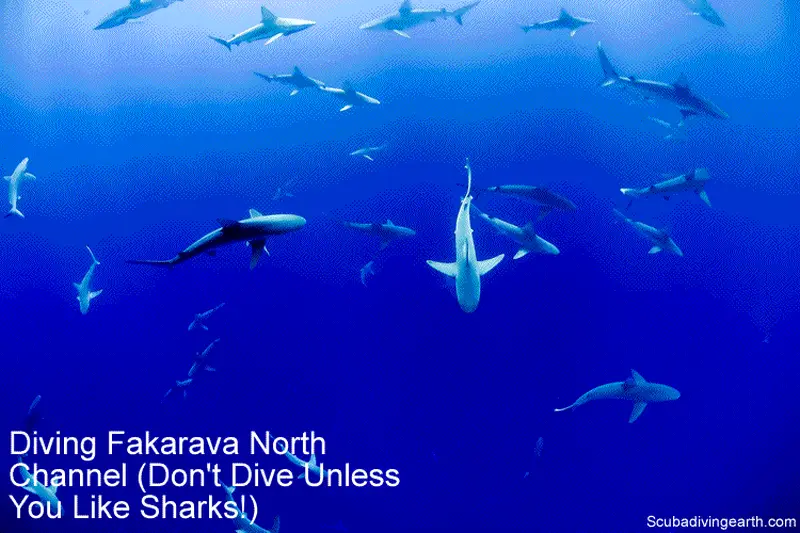
Dive the stronger currents of Fakarava North Pass to be amazed at the abundance of sea life
Scuba diving Fakarava North Pass is an incredible experience. But you need to be able to dive in a current. The currents in Fakarava North Pass are much stronger than if you’re diving Fakarava South Pass.
Scuba diving Fakarava North Pass is almost a guarantee to see reef sharks. Diving is normally drift dives and at times with strong currents. Diving Fakarava North Pass is a top dive site of the world for diving with sharks and for the abundant sea life and stunningly healthy coral gardens.
The best way to dive the Fakarava is by a scuba diving liveaboard. You can check the latest and best deals on a Polynesia liveaboard using the following window:
Where is Fakarava Atoll?
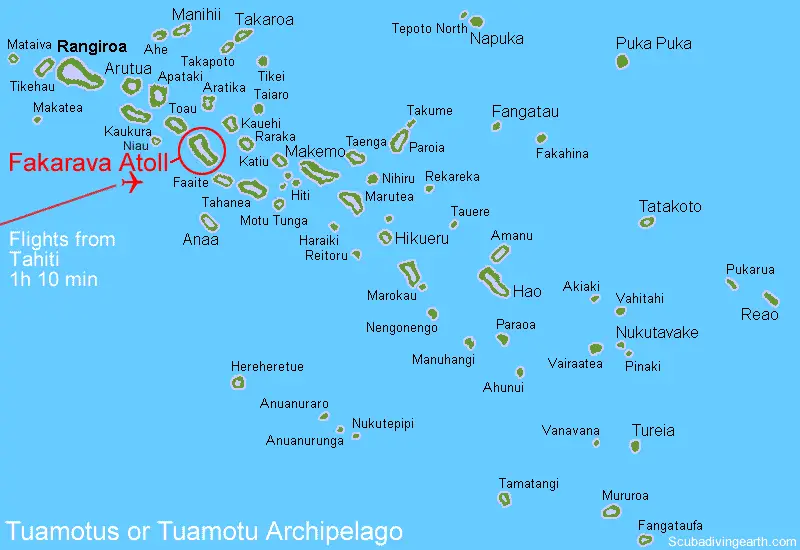
Fakarava Atoll is a small spec in the middle of the Pacific Ocean. Fakarava is a part of French Polynesia. It has been designated an UNESCO Biosphere Reserve. This reserve is for the preservation of rare species, including the proliferation of sharks.
The sharks in this biosphere reserve are protected. Which means they are safe from fishing and from becoming part of the Chinese delicacy shark fin soup.
Fakarava is one of seven atolls situated in the Tuamotu Archipelago. It is around 360 kilometres (225 miles) north east of Tahiti. Fakarava is the second largest atoll in Tuamotus, where the largest is Rangiroa.
The Atoll of Fakarava does have villages. The main village which has an airport is Rotoava.
Flights from Tahiti to Rotoava takes about one hour ten minutes. There’s not much on Fakarava Atoll and the main income of the islands is scuba diving. There are two scuba diving resorts on the Atoll itself. To dive Fakarava by liveaboard, follow this link to Polynesia liveaboards.
Top dive Fakarava French Polynesia – Diving Fakarava North Pass
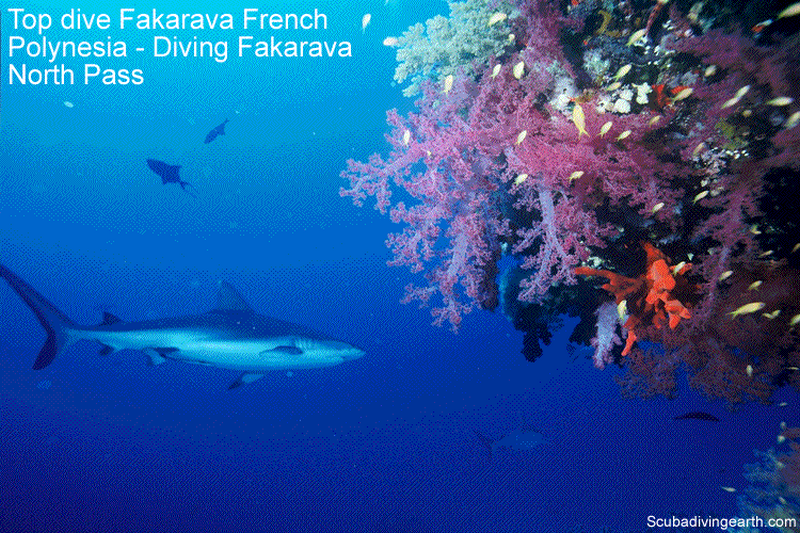
Fakarava North pass, or as it’s known locally the Garuae pass, is the larger of the two passes that enter the central lagoon. Whereas Fakarava south pass is about 200 metres (656 feet) wide, the north pass is closer to 1,600 metres (5,249 feet) wide.
The currents in the North pass are much stronger and the diving is only safe on an in-coming tide. This means your drift dive will lead you in through the channel and into the lagoon, rather than being taken out into the open ocean.
Having said that, if the current is flowing out through the north channel, you can still dive just outside the pass. Here you can usually scuba dive with the Mantas that frequent there.
Scuba diving Fakarava north channel is an all-year round dive site. There’s not really a best time to dive Fakarava, although the air and see temperatures change in the seasons, as does the humidity.
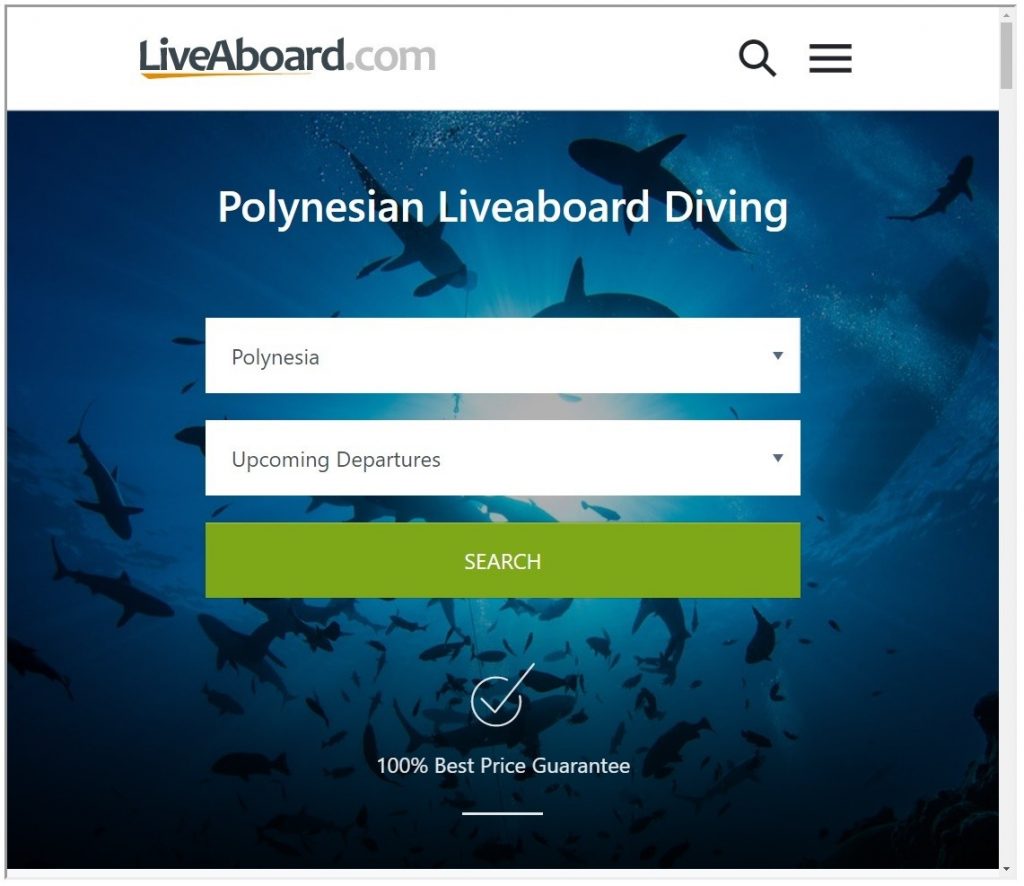
What to see when scuba diving Fakarava North Channel
The scuba diving Fakarava North Pass offers some pretty incredible diving. The corals in this large channel are incredibly beautiful. The corals gardens are healthy for two reasons.
The first reason is down to the daily strong currents that pass through the channel. These currents bring rich nutrients to feed the coral every day. The second reason is the lack of scuba diving traffic. This off-the-beaten-track dive site is not over dived like many dive sites around the world. Which means it’s not spoilt from accidental ‘hits’ from diver fins.
Although in the stronger currents, scuba divers sometimes have to hold-on to what they can to avoid being swept along in the current.
In addition to seeing the beauty of the coral gardens, you’ll also experience large animals. This will include:
- Schools of large tuna.
- Manta rays.
- Jacks.
- Snappers.
- Blacktip reef sharks.
- Whitetip reef sharks.
- Plus large schools of grey reef sharks.
- You also see large schools of Sennett fish, which are long mackerel-like fish.
Something that cannot be said for many places around the world is you are almost guaranteed to see sharks. Especially grey reef sharks.
Ali Baba” canyon when scuba diving Fakarava North Channel
One of the main attractions of the North Pass of Fakarava is the dive site which is away from the main drift current. This area is called “Ali Baba” canyon.
In Ali Baba canyon at times you’ll witness fish concentrated literally in their thousands, if not millions! Plus there are also hundreds of sharks that congregate in this canyon.
At times you almost have to fight your way through the shoals of fish that present as a wall of scales!
Video of Ali Baba canyon
Drift diving Fakarava North Pass
The best way to experience and dive Fakarava Atoll together with diving Rangiroa is by liveaboard boat. But as already mentioned, there are dive two resorts on Fakarava. But as with all land-based resorts, diving is more restrictive. Day boats can only travel so far each day.
A liveaboard can travel much further, so you’ll be able to dive the other Tuamotus atolls as well. Plus you get to do more dives on a liveaboard, with the option of night dives.
Having said that, Fakarava atoll is so stunning that some French Polynesia liveaboards spend their entire itinerary in its vicinity. So if this is your choice, then you may decide to stay in one of the pensions at Fakarava instead.

Before you venture out on a French Polynesian liveaboard, it’s also important to have a good amount of diving experience under your belt.
Currents through the atolls can be extremely strong, and may require the use of reef hooks. This is especially true of the North Pass, as mentioned above. The drift diving in the North Pass will be challenging, but at the same time rewarding too.
Also, the Polynesian authorities have strict regulations for diver safety.
For example, even if you have a deep diver certification you are not permitted to dive deeper than 30 meters (100 feet), unless you’re a PADI Rescue Diver.

Most of the Polynesian liveaboards require at least Advanced Open Water certification.
But also you usually require at least 50 logged dives under your belt.
There are two liveaboard dive boats that travel to French Polynesia. These are the French Polynesia Master, Polynesia and the Aqua Tiki II, Polynesia.
Scuba diving Fakarava North Pass video
Below is a great video to give you a flavour of what it’s like to dive Fakarava north pass.
This video is about diving Fakarava north side. Beautiful corals, lots of fish and marine life, and the famous drift dive through the Garuae in very strong current with grey reef sharks and silvertip sharks, white tip reef sharks, big tuna and more…
I hope you enjoyed this article about scuba diving Fakarava North Pass
I’d love to hear from you. Tell us about your adventures of diving and snorkeling, in the comments below. Please also share your photos. Either from your underwater cameras or videos from your waterproof Gopro’s!
If this article hasn’t answered all of your questions. If you have more questions either about snorkeling or types of scuba diving (or specifically about scuba diving Fakarava North Pass), please comment below with your questions.
There will also be many more articles about scuba diving (and snorkeling) for you to read and learn about these fabulous sports.
Have fun and be safe!

